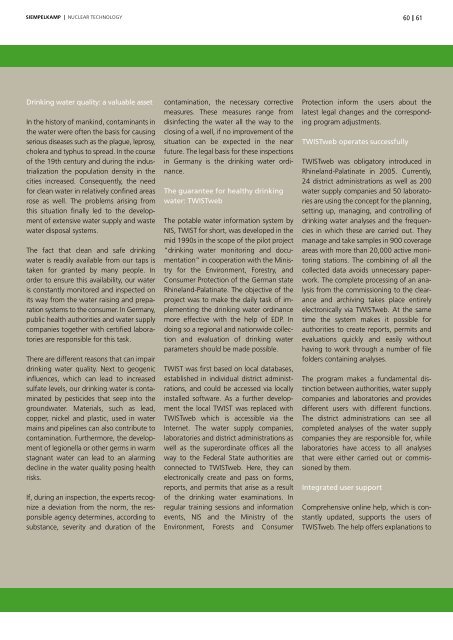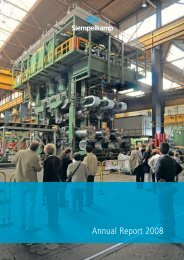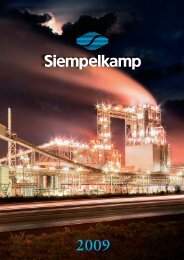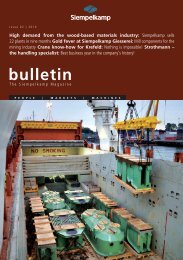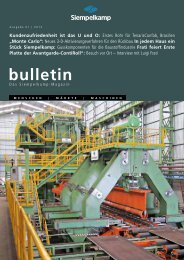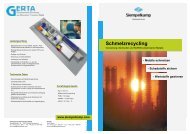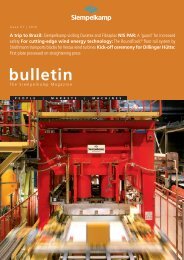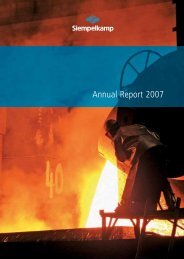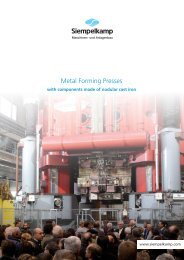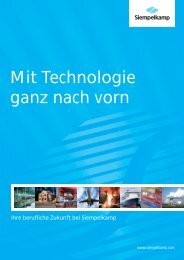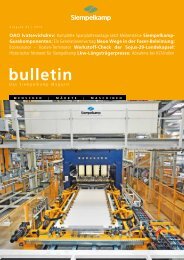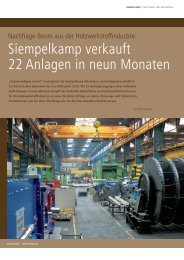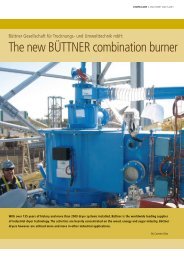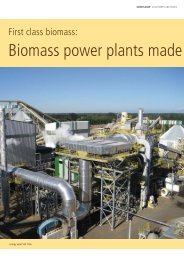Bulletin 1/2011 - Siempelkamp
Bulletin 1/2011 - Siempelkamp
Bulletin 1/2011 - Siempelkamp
You also want an ePaper? Increase the reach of your titles
YUMPU automatically turns print PDFs into web optimized ePapers that Google loves.
SieMpelkaMp | nUCLEAR tECHnOLOGy<br />
Drinking water quality: a valuable asset<br />
In the history of mankind, contaminants in<br />
the water were often the basis for causing<br />
serious diseases such as the plague, leprosy,<br />
cholera and typhus to spread. In the course<br />
of the 19th century and during the industrialization<br />
the population density in the<br />
cities increased. Consequently, the need<br />
for clean water in relatively confined areas<br />
rose as well. the problems arising from<br />
this situation finally led to the development<br />
of extensive water supply and waste<br />
water disposal systems.<br />
the fact that clean and safe drinking<br />
water is readily available from our taps is<br />
taken for granted by many people. In<br />
order to ensure this availability, our water<br />
is constantly monitored and inspected on<br />
its way from the water raising and preparation<br />
systems to the consumer. In Germany,<br />
public health authorities and water supply<br />
companies together with certified laboratories<br />
are responsible for this task.<br />
there are different reasons that can impair<br />
drinking water quality. next to geogenic<br />
influences, which can lead to increased<br />
sulfate levels, our drinking water is contaminated<br />
by pesticides that seep into the<br />
groundwater. Materials, such as lead,<br />
copper, nickel and plastic, used in water<br />
mains and pipelines can also contribute to<br />
contamination. Furthermore, the development<br />
of legionella or other germs in warm<br />
stagnant water can lead to an alarming<br />
decline in the water quality posing health<br />
risks.<br />
If, during an inspection, the experts recognize<br />
a deviation from the norm, the responsible<br />
agency determines, according to<br />
substance, severity and duration of the<br />
contamination, the necessary corrective<br />
measures. these measures range from<br />
disinfecting the water all the way to the<br />
closing of a well, if no improvement of the<br />
situation can be expected in the near<br />
future. the legal basis for these inspections<br />
in Germany is the drinking water ordinance.<br />
The guarantee for healthy drinking<br />
water: TWISTweb<br />
the potable water information system by<br />
nIS, tWISt for short, was developed in the<br />
mid 1990s in the scope of the pilot project<br />
“drinking water monitoring and documentation”<br />
in cooperation with the Ministry<br />
for the Environment, Forestry, and<br />
Consumer Protection of the German state<br />
Rhineland-Palatinate. the objective of the<br />
project was to make the daily task of implementing<br />
the drinking water ordinance<br />
more effective with the help of EDP. In<br />
doing so a regional and nationwide collection<br />
and evaluation of drinking water<br />
parameters should be made possible.<br />
tWISt was first based on local databases,<br />
established in individual district administrations,<br />
and could be accessed via locally<br />
installed software. As a further development<br />
the local tWISt was replaced with<br />
tWIStweb which is accessible via the<br />
Internet. the water supply companies,<br />
laboratories and district administrations as<br />
well as the superordinate offices all the<br />
way to the Federal State authorities are<br />
connected to tWIStweb. Here, they can<br />
electronically create and pass on forms,<br />
reports, and permits that arise as a result<br />
of the drinking water examinations. In<br />
regular training sessions and information<br />
events, nIS and the Ministry of the<br />
En vironment, Forests and Consumer<br />
60<br />
61<br />
Protection inform the users about the<br />
latest legal changes and the corresponding<br />
program adjustments.<br />
TWISTweb operates successfully<br />
tWIStweb was obligatory introduced in<br />
Rhineland-Palatinate in 2005. Currently,<br />
24 district administrations as well as 200<br />
water supply companies and 50 laboratories<br />
are using the concept for the planning,<br />
setting up, managing, and controlling of<br />
drinking water analyses and the frequencies<br />
in which these are carried out. they<br />
manage and take samples in 900 coverage<br />
areas with more than 20,000 active monitoring<br />
stations. the combining of all the<br />
collected data avoids unnecessary paperwork.<br />
the complete processing of an analysis<br />
from the commissioning to the clearance<br />
and archiving takes place entirely<br />
electronically via tWIStweb. At the same<br />
time the system makes it possible for<br />
authorities to create reports, permits and<br />
evaluations quickly and easily without<br />
having to work through a number of file<br />
folders containing analyses.<br />
the program makes a fundamental distinction<br />
between authorities, water supply<br />
companies and laboratories and provides<br />
different users with different functions.<br />
the district administrations can see all<br />
completed analyses of the water supply<br />
companies they are responsible for, while<br />
laboratories have access to all analyses<br />
that were either carried out or commissioned<br />
by them.<br />
Integrated user support<br />
Comprehensive online help, which is constantly<br />
updated, supports the users of<br />
tWIStweb. the help offers explanations to


